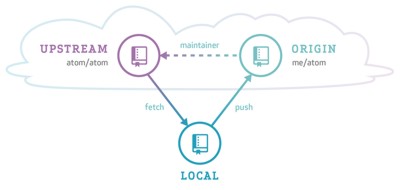| Git 2.5 Released |
| Written by Kay Ewbank | |||
| Monday, 10 August 2015 | |||
|
The latest version of Git has been released with support for multiple working trees and triangular workflows.
Git is the most popular version control system. Originally developed as a bunch of scripts to maintain the development of the linux kernel, it is fast, compresses well and has a lot of tools and resources that work with and around it, in particular GitHub. Previous versions of Git have enabled you to have two branches of a project, and either switch between the branches from a single repository, or to use a cloned copy of the repository so you can switch. The tricky thing until now has been keeping the clones in sync. The new version of Git has added a subcommand git worktree that creates additional working trees connected to an existing Git repository. Each linked working tree is a pseudo-repository with its own checked-out working copy. Its .git is actually a file that refers to the history and references from the main repository, according to a post about the new version on the Github blog. The new release has also improved support for triangular workflows. A triangular workflow is one where you fetch from a canonical "upstream" repository to keep your local repository up-to-date. When you want to share your own modifications with other people, you push them to your own fork and open a pull request, and if your changes are accepted, the project maintainer merges them into the upstream repository.
Git was already quite good at supporting this type of working, but the new version has clarified and improved the support, including adding a new command line shorthand <reference>@{push}. There’s a good walkthrough of how to use the support on the blog post. The performance of Git has also been improved, particularly when working with large working trees and working trees stored on networked file systems. One way this has been achieved is with the addition of an experimental feature that tells Git to examine only the modification times of directories when looking for new files. git index-pack also makes far fewer scans of the packed-refs directory, which can make a huge difference if the repository is on a networked file system, and Git now calls utime far less often when reusing existing packed objects. The final performance improvement has been achieved by removing the need for clean/smudge filters to read all of their input. This can help speed up filters such as Git Large File Storage that don't need to read the whole file contents to do their work. Alongside the new version of Git, comes news that GitHub has raised a second round of funding, adding another $250 million. This puts the company value at $2 billion, according to the Wall Street Journal. Git also has a new logo and its documentation has been redesigned. More InformationRelated ArticlesGit and GitHub top in popularity stakes Git and GitHub LiveLessons (review)
To be informed about new articles on I Programmer subscribe to the RSS feed, follow us on, Twitter, Facebook, Google+ or Linkedin, or sign up for our weekly newsletter.
Comments
or email your comment to: comments@i-programmer.info |
|||
| Last Updated ( Monday, 10 August 2015 ) |



